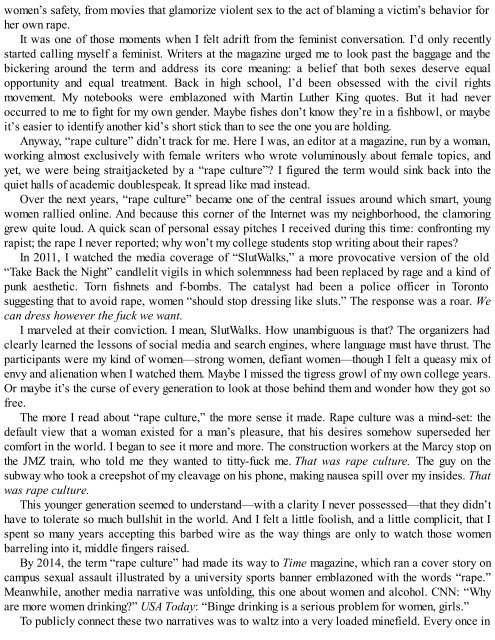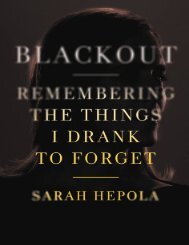Blackout_ Remembering the Things I Drank to Forget - Sarah Hepola
I’m in Paris on a magazine assignment, which is exactly as great as it sounds. I eat dinner at a restaurant so fancy I have to keep resisting the urge to drop my fork just to see how fast someone will pick it up. I’m drinking cognac—the booze of kings and rap stars—and I love how the snifter sinks between the crooks of my fingers, amber liquid sloshing up the sides as I move it in a figure eight. Like swirling the ocean in the palm of my hand.
I’m in Paris on a magazine assignment, which is exactly as great as it sounds. I eat dinner at a
restaurant so fancy I have to keep resisting the urge to drop my fork just to see how fast someone will
pick it up. I’m drinking cognac—the booze of kings and rap stars—and I love how the snifter sinks
between the crooks of my fingers, amber liquid sloshing up the sides as I move it in a figure eight.
Like swirling the ocean in the palm of my hand.
Create successful ePaper yourself
Turn your PDF publications into a flip-book with our unique Google optimized e-Paper software.
women’s safety, from movies that glamorize violent sex <strong>to</strong> <strong>the</strong> act of blaming a victim’s behavior for<br />
her own rape.<br />
It was one of those moments when I felt adrift from <strong>the</strong> feminist conversation. I’d only recently<br />
started calling myself a feminist. Writers at <strong>the</strong> magazine urged me <strong>to</strong> look past <strong>the</strong> baggage and <strong>the</strong><br />
bickering around <strong>the</strong> term and address its core meaning: a belief that both sexes deserve equal<br />
opportunity and equal treatment. Back in high school, I’d been obsessed with <strong>the</strong> civil rights<br />
movement. My notebooks were emblazoned with Martin Lu<strong>the</strong>r King quotes. But it had never<br />
occurred <strong>to</strong> me <strong>to</strong> fight for my own gender. Maybe fishes don’t know <strong>the</strong>y’re in a fishbowl, or maybe<br />
it’s easier <strong>to</strong> identify ano<strong>the</strong>r kid’s short stick than <strong>to</strong> see <strong>the</strong> one you are holding.<br />
Anyway, “rape culture” didn’t track for me. Here I was, an edi<strong>to</strong>r at a magazine, run by a woman,<br />
working almost exclusively with female writers who wrote voluminously about female <strong>to</strong>pics, and<br />
yet, we were being straitjacketed by a “rape culture”? I figured <strong>the</strong> term would sink back in<strong>to</strong> <strong>the</strong><br />
quiet halls of academic doublespeak. It spread like mad instead.<br />
Over <strong>the</strong> next years, “rape culture” became one of <strong>the</strong> central issues around which smart, young<br />
women rallied online. And because this corner of <strong>the</strong> Internet was my neighborhood, <strong>the</strong> clamoring<br />
grew quite loud. A quick scan of personal essay pitches I received during this time: confronting my<br />
rapist; <strong>the</strong> rape I never reported; why won’t my college students s<strong>to</strong>p writing about <strong>the</strong>ir rapes?<br />
In 2011, I watched <strong>the</strong> media coverage of “SlutWalks,” a more provocative version of <strong>the</strong> old<br />
“Take Back <strong>the</strong> Night” candlelit vigils in which solemnness had been replaced by rage and a kind of<br />
punk aes<strong>the</strong>tic. Torn fishnets and f-bombs. The catalyst had been a police officer in Toron<strong>to</strong><br />
suggesting that <strong>to</strong> avoid rape, women “should s<strong>to</strong>p dressing like sluts.” The response was a roar. We<br />
can dress however <strong>the</strong> fuck we want.<br />
I marveled at <strong>the</strong>ir conviction. I mean, SlutWalks. How unambiguous is that? The organizers had<br />
clearly learned <strong>the</strong> lessons of social media and search engines, where language must have thrust. The<br />
participants were my kind of women—strong women, defiant women—though I felt a queasy mix of<br />
envy and alienation when I watched <strong>the</strong>m. Maybe I missed <strong>the</strong> tigress growl of my own college years.<br />
Or maybe it’s <strong>the</strong> curse of every generation <strong>to</strong> look at those behind <strong>the</strong>m and wonder how <strong>the</strong>y got so<br />
free.<br />
The more I read about “rape culture,” <strong>the</strong> more sense it made. Rape culture was a mind-set: <strong>the</strong><br />
default view that a woman existed for a man’s pleasure, that his desires somehow superseded her<br />
comfort in <strong>the</strong> world. I began <strong>to</strong> see it more and more. The construction workers at <strong>the</strong> Marcy s<strong>to</strong>p on<br />
<strong>the</strong> JMZ train, who <strong>to</strong>ld me <strong>the</strong>y wanted <strong>to</strong> titty-fuck me. That was rape culture. The guy on <strong>the</strong><br />
subway who <strong>to</strong>ok a creepshot of my cleavage on his phone, making nausea spill over my insides. That<br />
was rape culture.<br />
This younger generation seemed <strong>to</strong> understand—with a clarity I never possessed—that <strong>the</strong>y didn’t<br />
have <strong>to</strong> <strong>to</strong>lerate so much bullshit in <strong>the</strong> world. And I felt a little foolish, and a little complicit, that I<br />
spent so many years accepting this barbed wire as <strong>the</strong> way things are only <strong>to</strong> watch those women<br />
barreling in<strong>to</strong> it, middle fingers raised.<br />
By 2014, <strong>the</strong> term “rape culture” had made its way <strong>to</strong> Time magazine, which ran a cover s<strong>to</strong>ry on<br />
campus sexual assault illustrated by a university sports banner emblazoned with <strong>the</strong> words “rape.”<br />
Meanwhile, ano<strong>the</strong>r media narrative was unfolding, this one about women and alcohol. CNN: “Why<br />
are more women drinking?” USA Today: “Binge drinking is a serious problem for women, girls.”<br />
To publicly connect <strong>the</strong>se two narratives was <strong>to</strong> waltz in<strong>to</strong> a very loaded minefield. Every once in





